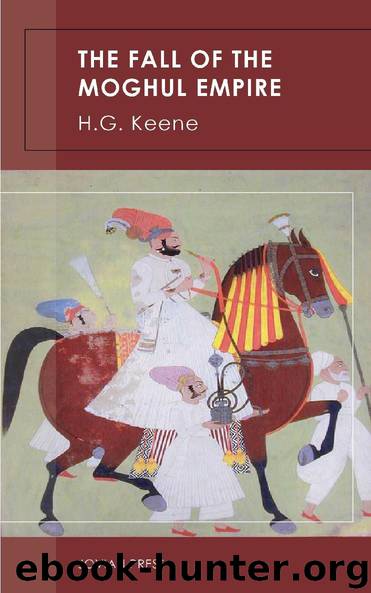The Fall of the Moghul Empire by H.G. Keene

Author:H.G. Keene
Language: eng
Format: epub
Publisher: Jovian Press
CHAPTER V.
~
A.D. 1786-88.
1786. The eldest son of the deceased chief of the Bawani Mahal was that Gholam Kadir, whom we have seen already in the character of a captive and a page. It does not appear under what circumstances he had recovered his liberty; but, on the death of Zabita Khan, he at once succeeded to his estates, under the title of “Najib-ud-daulah Hoshyar Jang.” As in the lower empire of Byzantium, so in the present case, in proportion as the State crumbled, the titles of its unserviceable supporters became more sonorous, until at last there was not a pillar of the ruinous fabric, however weak and however disengaged from the rest of the body, but bore some inscription equally “imposing” in both senses of the word. Daulah or Daulat means “The State,” and the Musalman nobles were called Arkan-i-Daulat “Columns of the Commonwealth.” Of these one was its Sword, another its Asaph (the “Recorder” of David and Solomon), a third its Hero, and a fourth its Shield. The young “Najib” Gholam Kadir Khan, was now the most prominent representative of the Hindustani Afghans. Among the Moghuls the leading spirit was Mohamad Beg of Hamadan, for whom the Patel provided employment by sending him with an army into Malwa, where he was for some time occupied by the siege of Raghogarh. This was a very strong fort, held by a colony of Kachwaha Rajputs since the times of Najaf Khan, and commanding one of the main roads between Hindustan and the Mahratta country. It had resisted the Mahrattas when they first invaded Malwa, and it was destined to resist Sindhia’s successors almost down to our own times. It is now a peaceful market town, and the traces of its former strength are all that it retains of a military character.
Sindhia’s progress in the Doab was more rapid, nor was it long before Musalman jealousy began to be aroused. The Patel opened negotiations with Mirza Jawan Bakht, having the object of inducing. that prince to return to the capital; but from this he was strongly dissuaded by the Viceroy Vazir, acting under the advice of Major Palmer, the British Resident at Lucknow. That gentleman considered the interests of the Company and of the Vazir as deeply bound up in the fate of the prince. Whilst he remained under their joint protection, the Mahratta usurpation must be incomplete; should he fall into the power of the Patel, a permanent Mahratta occupation would be established, which would be a serious danger indeed.
1787. Under these circumstances the acting Governor-General Macpherson, who, as already noted, had succeeded Mr. Hastings when the latter left India, resolved on retaining a British Brigade in the Doab; and Lord Cornwallis, on taking office the following year, confirmed the measure. That a change began to come over the policy of the British in India about this time is well known, however the English might strive to hide it from others or even from themselves: see, for instance, the following passage
Download
This site does not store any files on its server. We only index and link to content provided by other sites. Please contact the content providers to delete copyright contents if any and email us, we'll remove relevant links or contents immediately.
Talking to Strangers by Malcolm Gladwell(13345)
The Compound Effect by Darren Hardy(8941)
Tools of Titans by Timothy Ferriss(8363)
Wonder by R. J. Palacio(8097)
The Lover by Duras Marguerite(7892)
A Court of Wings and Ruin by Sarah J. Maas(7810)
The Circle by Dave Eggers(7104)
Deep Work by Cal Newport(7063)
Kaplan MCAT General Chemistry Review by Kaplan(6926)
To All the Boys I've Loved Before by Jenny Han(5838)
Wiseguy by Nicholas Pileggi(5769)
The Body: A Guide for Occupants by Bill Bryson(5079)
Eat That Frog! by Brian Tracy(4524)
1,001 ASVAB Practice Questions For Dummies by Powers Rod(4500)
Cracking the GRE Premium Edition with 6 Practice Tests, 2015 (Graduate School Test Preparation) by Princeton Review(4274)
Pre-Suasion: A Revolutionary Way to Influence and Persuade by Robert Cialdini(4218)
Barron's AP Biology by Goldberg M.S. Deborah T(4145)
ACT Math For Dummies by Zegarelli Mark(4043)
Alive: The Story of the Andes Survivors by Piers Paul Read(4017)
